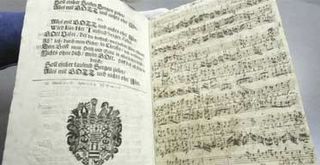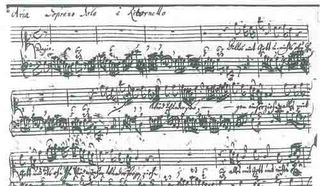

Unknown original handwritten score of our beloved J.S. Bach
Taken from http://www.bach-leipzig.de/Woo!! Another work by my favourite composer is found! Praise the Lord! Have been listening to St Matthew Passion by Bach recently. This new vocal work may not be as large scale or major a work as the passion, but I can't wait for the recording to be released!! Sir John plans to record this piece before Christmas and perform it at London's Cadogan Hall on the 18th December 05. The last work by Bach which was discovered was in 1975 - extra canons for the piano in the composer's own handwriting. And as mentioned above, the last vocal work by Bach was discovered in 1935. And now, another work by the legendary composer has surfaced in 2005. To think that it was hidden in a elusive old shoebox for three centuries, concealed with some poems and verses. Apparently, from what Professor Wolff, the world's leading expert on J.S Bach, has mentioned, we don't know much about Bach from this period for very little has survived. Never mind, hope that we shall be able to see more of Bach's works surfacing in the near future. =)
A completely unknown composition by Johann Sebastian Bach was discovered at the Anna Amalia Library in Weimar, Germany by a researcher from the Leipzig Bach Archive. The discovery was made by Michael Maul in the course of a systematic survey of all central German church, communal, and state archival collections, an ongoing research project begun in 2002 and supported by the Packard Humanities Institute and the William H. Scheide Fund.
The score in Bach’s own hand dates from October 1713 and represents a setting of a strophic aria with ritornello for soprano, strings, and basso continuo composed on the occasion of the 52nd birthday of duke Wilhelm Ernst of Saxe-Weimar, whom Bach then served as court organist. The twelve-stanza sacred poem with the text incipit "Alles mit Gott und nichts ohn’ ihn" (Everything with God and nothing without him), the duke’s motto, was written by the theologian Johann Anton Mylius.
There has been no previous record of, or reference to, this composition. Moreover, in the seventy years since the 1935 discovery of the single-movement cantata fragment “Bekennen will ich seinen Namen” (BWV 200) no unknown authentic vocal work by Bach has come to light.
“It is no major composition but an occasional work in the form of an exquisite and highly refined strophic aria, Bach’s only contribution to a musical genre popular in late 17th-century Germany,” said Professor Christoph Wolff of Harvard University, chair of the Board of the Bach Archive, initiator, and supervisor of the current research project. “I am extremly proud of Michael who is a most resourceful researcher,” he added. “In less than three years he uncovered an unparalleled number of new archival Bach documents, but this is the first time he presented a musical discovery. The overall research project is far from being over and I am quite sure that sooner or later Michael Maul will make news again.”
A facsimile and performing edition of the newly discovered piece will be published in the fall of 2005 by Bärenreiter-Verlag of Kassel, Germany. The first recording will be prepared by Sir John Eliot Gardiner, this year’s winner of the Bach Medal of the city of Leipzig.

No comments:
Post a Comment